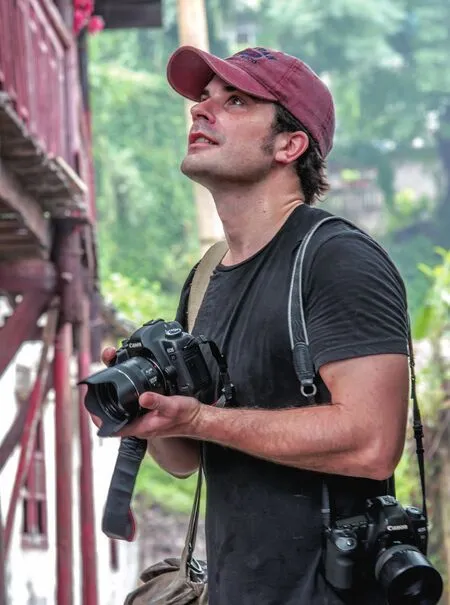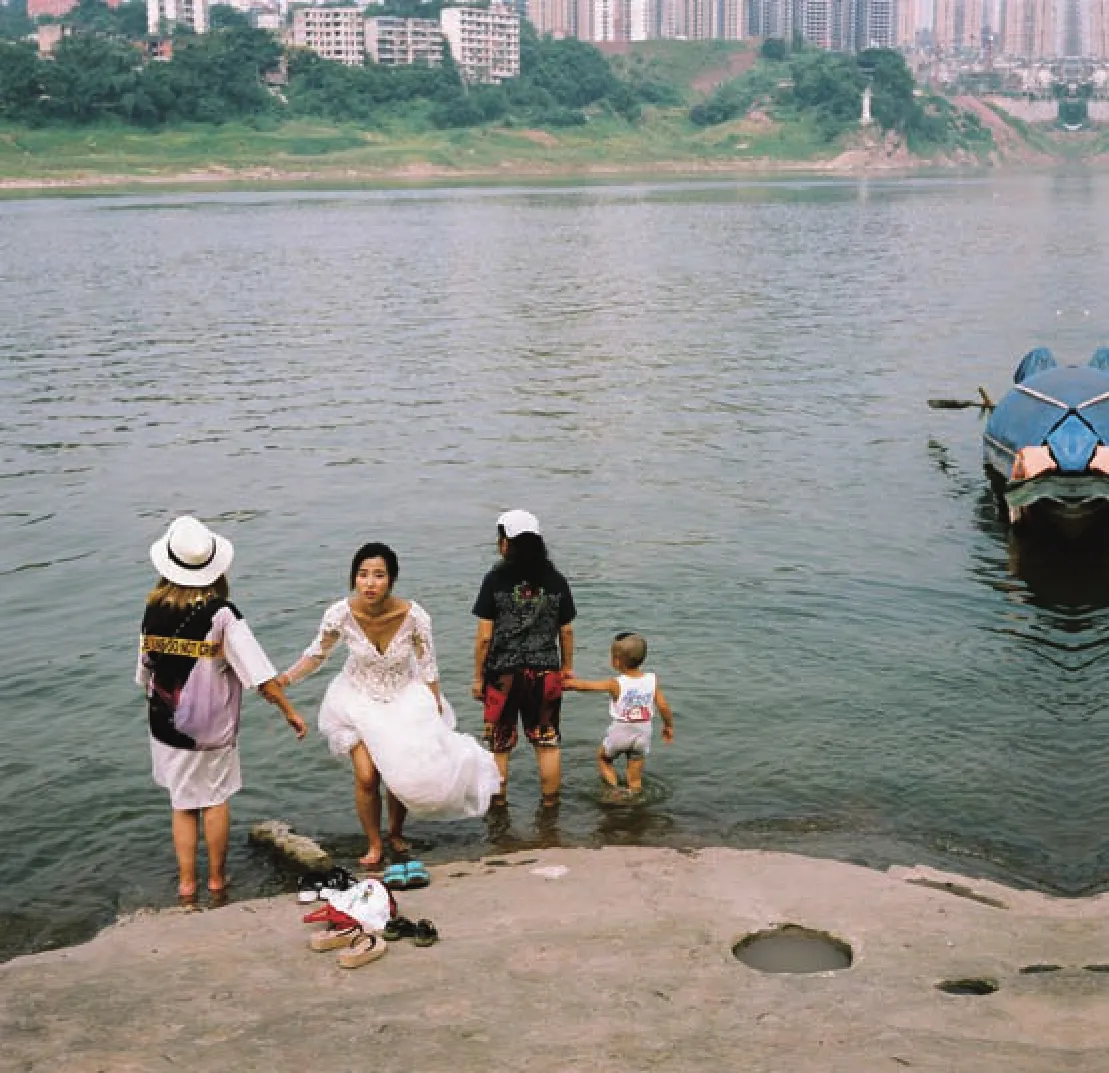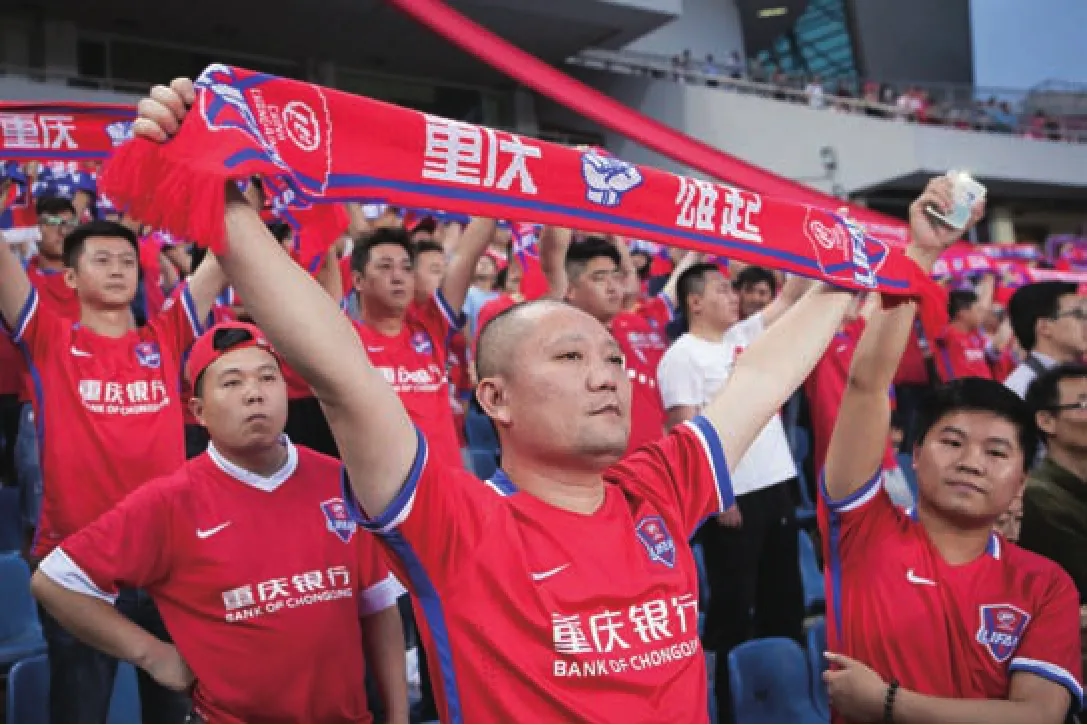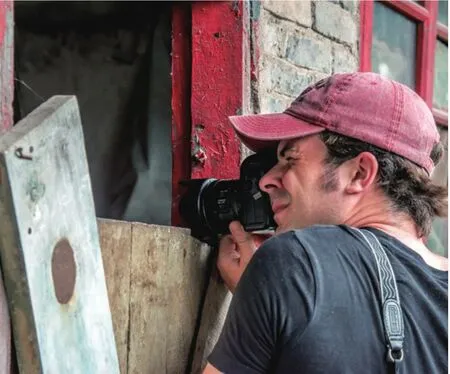在重庆小巷里攻读“硕士”
2017-09-28刘汪洋受访者提供
◇文|本刊记者 韩 希 图| 刘汪洋 受访者提供
在重庆小巷里攻读“硕士”
◇文|本刊记者 韩 希 图| 刘汪洋 受访者提供
“比起重庆,我的家乡牛津只能算是个村子。这里可有3000多万人呐,跟加拿大差不多了。”自由摄影师道格拉斯·霍克,帅气,阳光。2014年底,怀揣对未知的好奇,他从英国牛津来到中国重庆。
平日里,除了在培训学校教孩子们英语,他大部分时间都放在了自己的“研究”上,用相机研究这座令他着迷的中国内陆城市。他去过北京、上海、广州,然而还是坚定地选择重庆落脚,“这里有真正的新旧文化融合,尤其是观念上的。”
2013年,道格拉斯在英国格鲁斯特大学完成了本科学习,专业是新闻摄影,在问及为何没有继续深造时,他说这个专业的研究生学习,应该去不同的地方经历体验生活,进行纪录片式的图片拍摄。机缘巧合,他首先选择了重庆作为攻读“硕士”学位的第一站,一呆就是三年。
“Compared with Chongqing, home to more than 30 million people, my hometown Oxford can only be considered as a small village. The population of the city is close to that of Canada.” Embracing curiosity for the unknown, Douglas Hook, a handsome, positive freelance photographer, came from Oxford, the UK, to Chongqing, China in the end of 2014.
In his daily life, apart from teaching kids English at a training school, Douglas spent most of his time on his “research”—to explore the inland city with his camera, which beckoned him deeply. Once a traveler to Beijing, Shanghai, and Guangzhou, he loyally chose to settle in Chongqing. “The city truly combines new and traditional cultures, especially that in concept.”


Majoring in photojournalism, Douglas obtained his bachelor’s degree in University of Gloucestershire in the UK in 2013. When asked why he did not pursue advanced studies, he said a postgraduate student of this major should experience life in different places and take photos as a documentary. By chance, he chose Chongqing as the first station to do his “master’s degree”, and he has been here for three years.
不是他想象的样子Contrary to His Imagination
道格拉斯17岁辍学,去澳大利亚工作,2010年到2013年进入英国格鲁斯特大学学习。在很长一段时间里,他能接触到的关于中国的事情很少,更不用说重庆。直到从一个英格兰朋友的哥哥那里亲耳听到关于重庆的点滴,这个东方城市的形象才在他脑中揭开了幕布的一角。朋友的哥哥当时在重庆教英语,他传递的信息是:重庆很漂亮,重庆人很友好。
2014年底,他乘飞机直抵重庆。飞机还没落地,他已经看到了五颜六色的城市,一片生机。从西方来到东方,道格拉斯描述重庆时,用的第一个词是:大(英文的massive)。“比起重庆,我的家乡牛津只能算是个村子。这里可有3000多万人呐,跟加拿大差不多了。”他边说,边张开手臂,比划出一个大大的球型,露出难以置信的表情。
点亮他的,还有重庆人对“老外”的专属热情。他遇到问题,重庆的朋友会立马停下手头的事情来帮他解决;排队买咖啡时即便偶尔有个别本地人加塞,也不会故意绕到他前面;电梯门要关上了他还没跑拢,总有人帮他摁住开门键。“重庆人对自己人可能都没那么客气,对我们确实没得说。”
“来到这里有没有跟预想中不一样,或者,失望的地方?”我问他。
“我和我的朋友们不太喜欢预设,或是带着期待而来。对重庆的爱像是一个波浪形,不断往上攀升,思乡的时候,这条曲线又会下降一点,然后又上升,就这样起伏。但最低点也是满满的喜爱。”当过兵、身材结实的道格拉斯还说,重庆给他很大的安全感。


Douglas dropped out of school at the age of 17, worked in Australia, and studied in University of Gloucestershire from 2010 to 2013. He had been exposed to little knowledge of China for a long time, let alone Chongqing. The image of the city in the Orient was not unveiled to Douglas until he heard about Chongqing from the brother of his friend. As an English teacher in Chongqing, this man told to Douglas it is a beautiful city where people are friendly.
Douglas arrived in Chongqing by flight in the end of 2014. Before landing, he already had a bird’s eye view of the colorful, animated city. The first word he used to describe Chongqing was “massive”.“Compared with Chongqing, home to more than 30 million people, my hometown Oxford can only be considered as a village. The population of the city is close to that of Canada.” said Douglas, holding out his arms to draw a large globe, an amazed expression on his face.
Besides, what surprised him most is the especially welcoming Chongqing people. His Chinese friends would put aside their own affairs to help him tackle his problems. Occasionally, some locals would cut in the line, but not before him. Some people would press the open button of the lift before he ran to catch it. “Chongqing people not necessarily treat their fellows so kindly, but they are indeed so nice to us.”
“Is there something different to your expectations, or that let you down?” I asked him.
“My friends and I don’t feel like expecting anything before coming here. My love for Chongqing is like a wave, which constantly rises. When I miss my hometown, this wave will drop a little bit, and then it will rise again - it rises and falls this way. But the lowest point of the wave is also filled with my passion for Chongqing.” Once a soldier, the strong foreigner added that Chongqing gave him a sense of security.


挖掘城市的表象以下Exploring What Is below the Surface of the City
中国文化博大精深,很多外国人喜欢逛中国大大小小的城市。但对道格拉斯而言,仅仅重庆一座城,就足够他探索很久了。上海、广州,在他眼里就是其他国家也会有的城市,北京有很多古建筑,但人们的生活方式早已彻底改变。在重庆,道格拉斯能够很容易看到昔日老重庆生活的本真。
在他的住所和工作的大厦里,从窗户望出去,不时会看到有人家在屋顶或阳台上放一个大大的圆盘,把豆子摊开来晒;江边上还有力哥,替人们担很重的东西;战时防御用的防空洞,现在还有机地成为城市的一部分……
这些城市生活的“遗迹”是让道格拉斯驻足的研究“课题”,他始终坚持在这里扎营。然而眼睛和镜头捕捉到的,他认为只是表象(surface),“比如,我很好奇,在这里,总是看到外公外婆婆婆爷爷在带孙子孙女,这太有趣了,在我的家乡是不会有的。”还有一些时候,这里的人们会为了一些事情打破既有的规则,在英国他也会遇到类似情况,但他总觉得原因各有不同。这些表象之下的文化、社会背景是什么?他说,这里很多类似的现象让他惊奇,他没有时间去其他地方了,在离开中国以前,他要扎根这里,不断挖掘表象以下的根源。
道格拉斯有一个自己的网站,上面保存着他在重庆的拍摄研究成果。防空洞、两江汇合处、球迷、乡村、学校……每个专题里,他都会写一篇文字,讲述画面场景中生活方式的变迁和历史背景,类似于一份图文形式的纪录片。他告诉我,防空洞这一主题,从调研到拍摄,他花了整整6个月时间。他的作品里没有知名的景点,那些表面繁华、内里商业的地方,似乎不在他的“课题”以内。
Many foreigners enjoy travelling to various cities in China, a country rich in cultures. But for Douglas, mere the city of Chongqing took him a long time to explore. In his eye, Shanghai or Guangzhou are like most modern cities in other parts of the world. In Beijing, though many historic buildings remain, people’s lifestyles have been changed completely.However, the real look of old-fashioned lifestyles remains in Chongqing.
For example, looking out from the windows of his house and workplace, Douglas would sometimes see a big round flat bamboo product on roofs or balconies, which is filled with beans under the sunshine. Alongside the banks of the river, porters would help people carry heavy luggage. Air-raid shelters used for defense in wartime have become part of the city.
These “relics” of urban life attracting Douglas to stay here and study the city, he decided to settle down here. “What eyes and cameras can capture is only what stays on the surface.” he said, “Like I always see grandparents look after their grandchildren in Chongqing, which never happens in my hometown. I’m very curious about it.” Sometimes in Chongqing, people broke rules for some reason, which also happened in the UK. But he thought reasons varied, and he always wondered the culture and social background under the surface. Douglas said that many phenomena like this in Chongqing amazed him, and he had no time to explore other places. He would settle down in Chongqing to dig out the roots under the surface before leaving China.
Douglas has a website where he uploads his photo shooting, including air-raid shelters, the confluence of Jialing River and the Yangtze River, football fans, villages, schools...In each special topic, he writes a report to describe changes and backgrounds of the lifestyle in the scene, making his works a documentary with pictures and interpretations. Douglas told me that he has spent 6 months studying the topic of air-raid shelters from research to photo shooting. Famous scenic spots, however, were not included in his works, nor the places with glittering facade and commercialized interior.


赞颂真正的文化遗址Praises for Genuine Cultural Relics
在西方,人们对东方的历史知之甚少。所以,他们相信“读万卷书不如行万里路”,在现实的世界里看到最鲜活的历史遗迹,耳闻岁月留下的故事,对他们来说是最好的认知。于是,磁器口、洪崖洞、重庆天地,这些有名的都市复古怀旧景点,道格拉斯基本上都去过。可他知道,历史里最真实的部分已经不属于那些地方了。
拆迁以前的十八梯令他痴迷,他知道那里的一砖一瓦,那是厚重的真实存在。他说,他来重庆的第一年,就去了很多次十八梯,差不多一周就要去一次。对他来说,未来的十八梯就是另一个“磁器口”。他的困惑在于,在英国,很多建筑都是很老很老的,可人们不会想到要拆掉重建,只会想办法修复,可在重庆,解决方式就不太一样了。尽管他明白,重建是对原生居民生活极大的改善,比如居住条件、安全等,可他依然唏嘘不已,“我觉得重庆应该多一些对自己真实文化和历史的赞颂(他的原话是celebration,中文有庆祝、赞颂之意),旧的东西不一定要拆掉,真实就是美的。”
当我跟他分享一篇介绍重庆开埠时英国人在这里留下的遗址的文章时,他非常高兴地听我给他一一翻译,看到那些遗址现在还保留着,他指着照片兴奋地说“exactly”。言下之意,这些遗迹的留存就是他所谓的“赞颂”。
他的这个想法,或许从他脚上的鞋子可见一斑。那是一双20几块钱的绿色劳保布鞋,购于他家楼下的商店里,看着与时髦格格不入,可他却经常在穿,很是喜欢。想来,这么多年过去仍能轻易地买到,舒适度也自然是有的,那又何乐而不为呢?这样的“赞颂”方式,大抵也是可贵的。

In the West, people know little about the eastern history, and thus they believe that to travel to the East is better than to read about it. To observe the most dynamic historic relics in the real world and to listen to the story of the old years is the best way for them to acknowledge the eastern world. Douglas has been to such places for nostalgia as Ciqikou, Hongya Cave and Chongqing Tiandi. However, he knows that the most genuine part of the history didn’t belong to these places.
Before its demolition, Shibati attracted Douglas so much that he could tell every piece of it. He visited it almost once a week during his first year in Chongqing, but he said that it will become another Ciqikou in the future. What bewildered him were the measures taken to deal with old buildings. In Britain, there are many ancient buildings, which are restored rather than demolished and reconstructed. Although he understands that reconstructions would greatly improve the citizens’ living conditions and ensure their safety, he still insists that Chongqing should retain the celebration to its culture and history and old things do not have to be removed, as the genuine is beauty.
When I shared with him an article by interpreting it word by word, which introduced the relics left by Englishmen when Chongqing opened as a commercial port, he was so delighted. Seeing that the relics still exist, he excitedly pointed at the pictures, “exactly!” The very existence of the relics is what he meant by celebration.
We could also get a hint of Douglas’ viewpoints from his shoes, a pair of green cloth shoes worth some 20 Yuan from the shop downstairs. Though the shoes are old-fashioned, he often wears them and likes them very much. The shoes are comfortable and still available after dozens of years, so why not try it? His way of “celebration” is probably precious.
A Foreigner Doing a Master’s Degree in Chongqing’s Alleys
Article | Han Xi Pictures | Liu Wangyang Interviewee
